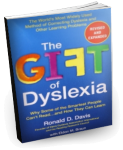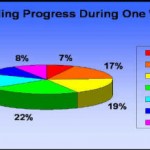Test for Dyslexia: 37 Common Traits
Most dyslexics will exhibit about 10 of the following traits and behaviors. These characteristics can vary from day-to-day or minute-to-minute. The most consistent thing about dyslexics is their inconsistency.
General:

Dyslexic children and adults can become avid and enthusiastic readers when given learning tools that fit their creative learning style.
- Appears bright, highly intelligent, and articulate but unable to read, write, or spell at grade level.
- Labelled lazy, dumb, careless, immature, “not trying hard enough,” or “behavior problem.”
- Isn’t “behind enough” or “bad enough” to be helped in the school setting.
- High in IQ, yet may not test well academically; tests well orally, but not written.
- Feels dumb; has poor self-esteem; hides or covers up weaknesses with ingenious compensatory strategies; easily frustrated and emotional about school reading or testing.
- Talented in art, drama, music, sports, mechanics, story-telling, sales, business, designing, building, or engineering.
- Seems to “Zone out” or daydream often; gets lost easily or loses track of time.
- Difficulty sustaining attention; seems “hyper” or “daydreamer.”
- Learns best through hands-on experience, demonstrations, experimentation, observation, and visual aids.
Vision, Reading, and Spelling:
- Complains of dizziness, headaches or stomach aches while reading.
- Confused by letters, numbers, words, sequences, or verbal explanations.
- Reading or writing shows repetitions, additions, transpositions, omissions, substitutions, and reversals in letters, numbers and/or words.
- Complains of feeling or seeing non-existent movement while reading, writing, or copying.
- Seems to have difficulty with vision, yet eye exams don’t reveal a problem.
- Extremely keen sighted and observant, or lacks depth perception and peripheral vision.
- Reads and rereads with little comprehension.
- Spells phonetically and inconsistently.
Hearing and Speech:
- Has extended hearing; hears things not said or apparent to others; easily distracted by sounds.
- Difficulty putting thoughts into words; speaks in halting phrases; leaves sentences incomplete; stutters under stress; mispronounces long words, or transposes phrases, words, and syllables when speaking.
Writing and Motor Skills:
- Trouble with writing or copying; pencil grip is unusual; handwriting varies or is illegible.
- Clumsy, uncoordinated, poor at ball or team sports; difficulties with fine and/or gross motor skills and tasks; prone to motion-sickness.
- Can be ambidextrous, and often confuses left/right, over/under.
Math and Time Management:
- Has difficulty telling time, managing time, learning sequenced information or tasks, or being on time.
- Computing math shows dependence on finger counting and other tricks; knows answers, but can’t do it on paper.
- Can count, but has difficulty counting objects and dealing with money.
- Can do arithmetic, but fails word problems; cannot grasp algebra or higher math.
Memory and Cognition:
- Excellent long-term memory for experiences, locations, and faces.
- Poor memory for sequences, facts and information that has not been experienced.
- Thinks primarily with images and feeling, not sounds or words (little internal dialogue).
Behavior, Health, Development, and Personality:
- Extremely disorderly or compulsively orderly.
- Can be class clown, trouble-maker, or too quiet.
- Had unusually early or late developmental stages (talking, crawling, walking, tying shoes).
- Prone to ear infections; sensitive to foods, additives, and chemical products.
- Can be an extra deep or light sleeper; bedwetting beyond appropriate age.
- Unusually high or low tolerance for pain.
- Strong sense of justice; emotionally sensitive; strives for perfection.
- Mistakes and symptoms increase dramatically with confusion, time pressure, emotional stress, or poor health.
Related Articles
Common Characteristics of Adult Dyslexia
Most adult dyslexics will exhibit at least 10 of the following traits and behaviors. These characteristics are often inconsistent, and may vary depending upon the day or situation.
Career:
Employed in job/position that will hide difficulties...
Davis Program Average Reading Gains
Statistics from Rocky Point Academy
Davis Facilitators Lawrence and Stacey Smith have assembled data showing reading level gains for more than 360 clients who completed the Davis Dyslexia Correction® program at their center, Rocky Point Academy , in Calgary, Canada.





